Jon Woolcott contemplates the family histories lost to time.
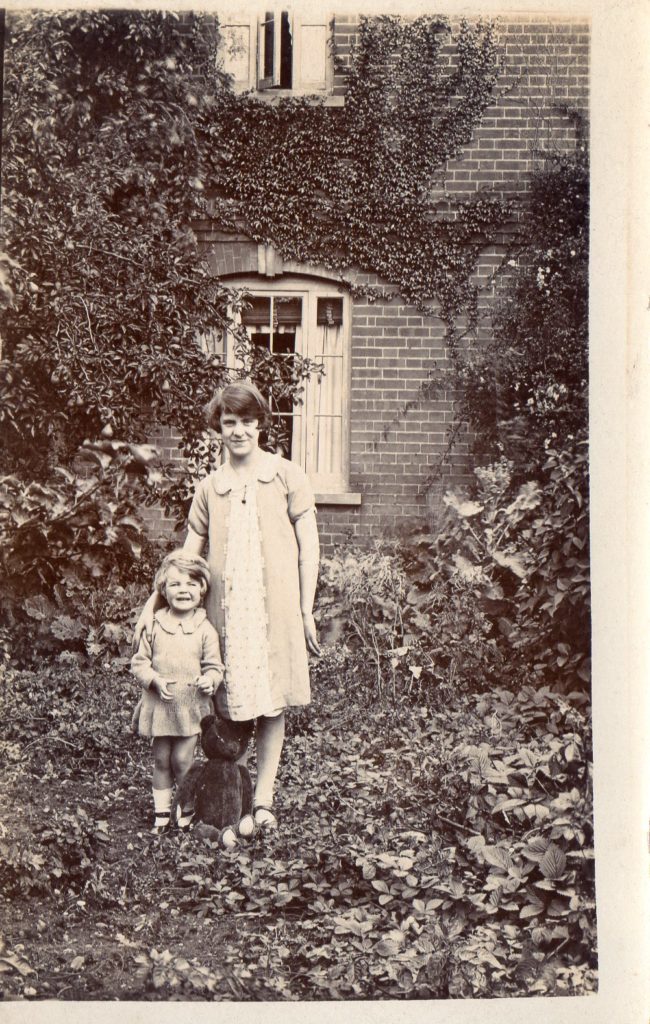
Lacuna: noun 1. lake, 2. a hiatus, blank, missing part.
My mother spent the final months of her life on the outskirts of a town she had no connection with, five miles from where I live in Dorset. Except for my convenience she had no reason to be there. Her previous moves were beginnings: to start her career, her family, a new marriage; but this last journey which we took together in a private ambulance was a surrender, a leaving without arrival. In the days when I sat in her warm room in the nursing home, punctuated by the catering staff bringing tea, biscuits and the always-refused offer of a glass of sherry before lunch, she talked. We avoided discussing the future. We had resolved the practicalities: her will and funerary wishes. The past was safer ground.
Mum was the last connection with part of our history – the Suffolk villagers of her mother’s family, but also her father’s relatives from Cardiff and Carmarthen and Merthyr. Over the years I had tried to record some of this – from my grandmother and aunt, and now mum. I scribbled on the backs of envelopes or asked if they minded the dictaphone whirring on the coffee table. There were trips to Nana’s residential home, or to see my aunt in Littlehampton on the Sussex coast. Auntie Joan’s Alzheimer’s made the conversation repetitive and awkward, at least for me; in any case while her long-term memory was unclouded, she was hemmed in by prejudices towards long-dead family members. By contrast my grandmother retained a tac-sharp mind, but she was garrulous; it was hard to pinpoint each person, their parents, occupations, stories, characters. The Evans’, the southern Welsh branch of the family, were especially confusing: a ramshackle bunch, unreliable in life and unreliable narrators to their own history. My maternal great grandfather William claimed to be a poet of some note, receiving the ultimate Welsh literary accolade – chaired as Bard at the national Eisteddfod (he wasn’t). He told everyone he was the Assistant Chief Librarian at Cardiff Library – an assertion repeated on his death certificate (he was actually caretaker of a small reading room in Cardiff’s docks). Before becoming this distinguished man of letters he had once been a pharmacist (he wasn’t). On the 1911 census return he claimed to be a ‘Master Printer – Letterpress’, although how he managed to squeeze this between his other accomplishments is not clear. His two sons, David and Thomas, were differently unreliable. Great Uncle Tom walked across part of Wales and the belt of England, from Cardiff to Ipswich, sometime in the 1920s. Tom was married: he and Dora had a son, but his journey was to visit my grandmother, his brother’s wife, with whom he was in love. But I don’t know if this is true. He vanished in 1928 and no-one knows what became of him – his mother believed he had drowned in a lake near his home, others that he had left for the United States, jumping on board one of the ships he must have seen from his father’s Reading Room. His son, whom I tracked down a few years ago, told me that he had simply abandoned them.
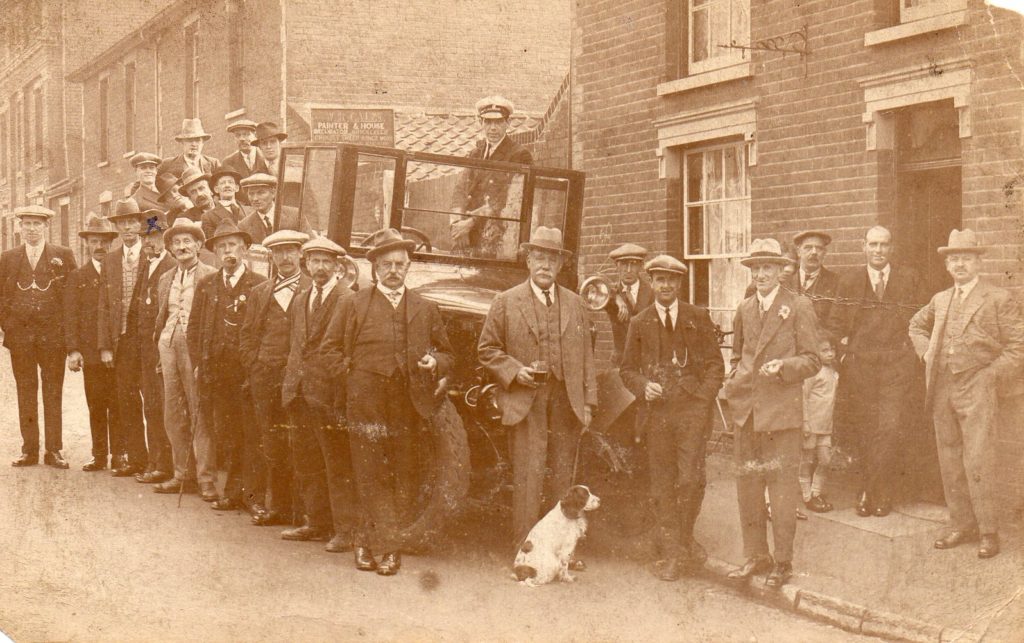
I have a file crammed with notes and certificates that holds everything I have recorded over the years, in fits and starts, frustrated by the dead-ends and gaps in life stories, the shifting memories, the small pool of first names: Davids and Toms and Williams and Roses and Jeans and Joans. The fading and mostly unlabelled snaps of people sitting in deckchairs in scrappy summer gardens, or uncomfortable in photography studios, or men standing next to charabancs in narrow city streets, a mysterious postcard of Cardiff Infirmary. There are very few letters. But in one from 1927, black-edged for mourning, Great Uncle Tom’s wife Dora wrote to my grandparents to tell of her mother’s death. She had to write so many letters in reply to expressions of sympathy that she felt ‘almost word dry and parched.’ Poor woman, whose husband was soon to emigrate, drown, or walk out.
My grandfather David supplied this family of small-scale fantasists and miscreants with their final flourish. Elsie, my grandmother, took him east to Ipswich when she vaulted the prejudices of the age and became manager of a dairy, employing her husband as a driver, his own ambitions being vague. One idea David did have was to leave, when my mother was a small child. He returned ten years later, after a long affair, only as cancer began to claim him. Nana nursed him through the long summer of his death, and she never once complained, said mum.
As mum grew almost imperceptibly weaker by the day, I learned more about my grandfather. There are few photos and David died before colour film was widely available, but I was told his hair was a deep red. He loved animals, mum said, and in his teenage years went to work on a quiet island off the south coast of Wales that was famed for its wildlife. Mum’s memory and concentration were affected by the morphine. Her chat was sometimes trippy, muttering phrases that were like unmatched jigsaw pieces, with references to daytime television presenters or some detail I had told her about my life. But there were also bright shards of lucidity and she always knew her own mind. I suggested a likely island.
Lundy? She shook her head, rested back on the too many pillows and closed her eyes, now sunken deeply in a face growing bony. Not Lundy. There was a pause.
Finally she said Barry Island. I thought this unlikely but said nothing.
I can’t know now, not for certain. The fading photographs and hand-drawn family trees, everything is out of reach, unresolvable and dissolving.
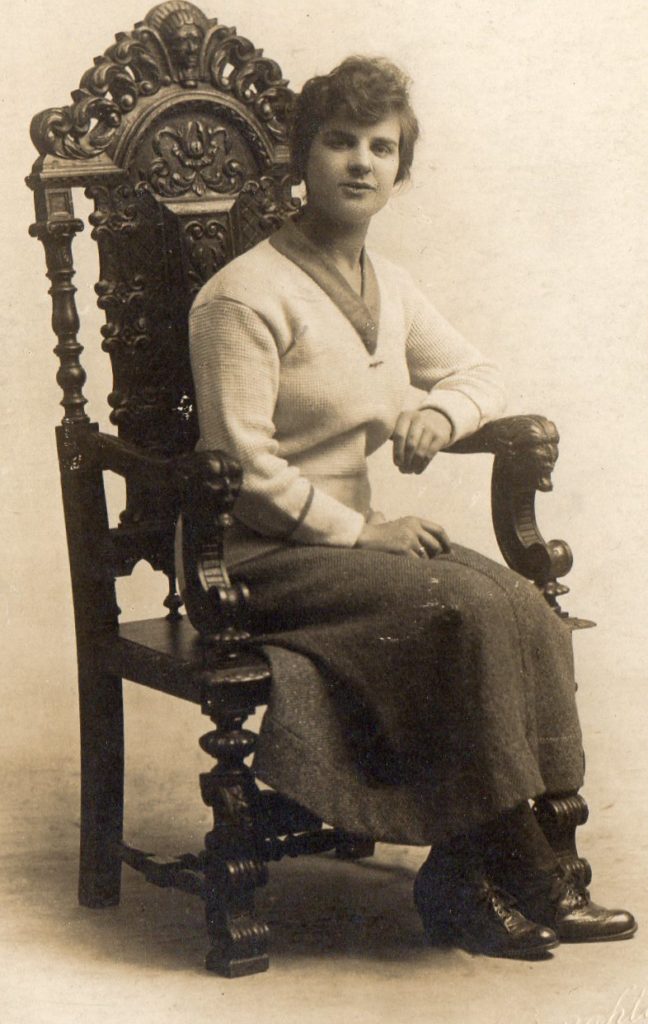
Jon’s grandmother, May. All other sitters unknown
Looking for answers I turned to R. M. Lockley’s slim contribution to the Britain in Pictures series, Islands Round Britain, published in 1945, which described the people, wildlife and landscapes of each of the more significant islands. Lockley was a writer and naturalist who made his home on the islands of Skomer and Skokholm. I had scanned his other books for mention of a wayward young man from Cardiff called David without success. Anyway, the consonants in these islands’ names stick hard: S, K, M – mum would surely have remembered them. A process of elimination then. Lockley says Caldey is ‘the first worthy island of Wales.’ He writes of the inhabitant monks’ daily routines, their abstemiousness, their careful agriculture and that tourists were tolerated, not encouraged. Was this my grandfather’s island? Caldey and Barry, easily mixed up in morphine and tiredness. Caldey is known for its wildlife, especially the red squirrel, now largely banished to islands.
*
In early summer three years ago my wife Helen and I took a short break in Pembrokeshire. The county was once known as ‘Little England Beyond Wales’, being largely Anglophone and having a long history of trade with England. Its open landscapes, high cliffs and wide sandy beaches have something in common with England’s south western counties. One warm and cloudy day we bought tickets at a booth on Tenby’s quayside and took a small boat to Caldey Island. We sat on wooden benches that ran along the sides of the ferry – echoes of childhood holidays, salt on the lips, a foretaste of chips on the fingers, gulls high and cormorants skimming the water.
Caldey: a holy island of sorts. Benedictine monks came here to escape the world before the Norman Conquest, and were here until the Reformation. The island retained its religious appeal: in the early years of the twentieth century Cistercian Trappists arrived. Today they make a living from their chocolate and perfume, for sale in the gift shop, but the brothers remained hidden behind the walls of the white, Italianate monastery.
We walked through cool woodland scattered with ruined buildings – a mill house and its discarded wheels and race – to the original priory standing on a little rise, next to a rectangular pond floated with black swans, mallards and their ducklings. The old half-abandoned buildings still had presence. The plain spire leant at a precarious angle. Beneath it was a small, very beautiful chapel, host to the sixth century Caldey Stone and more recent naïve wall carvings. Was my grandfather once here? He left so little trace of a life beyond his daughters’ and Nana’s memories. He died many years before I was born, his name barely a reputation. I don’t even know where he is buried, probably an untended plot in an Ipswich graveyard, a name lost under moss, something to trip over.
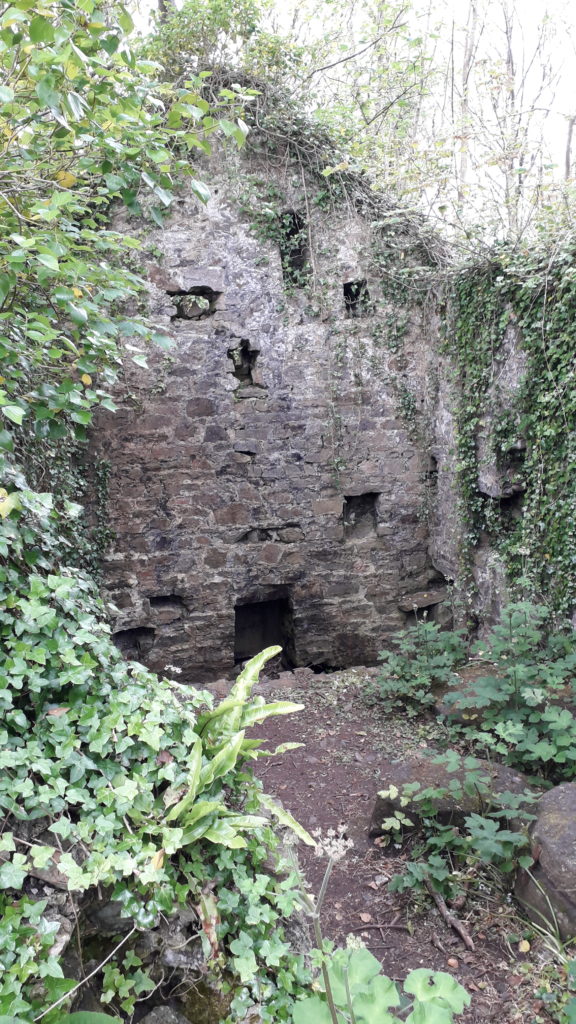
Caldey may have been David’s first leaving. An island life was a chance to escape his trajectory, to live in his own way and mind. My grandad and great uncle with their habit of disappearing, running from their lives, their children and capable wives, maybe given permission by their father’s fantastic self-inventions or the recent unhinging of the Great War. Their leavings were breaks in their stories, one a hiatus and one final.
We walked from the Priory to the lighthouse up a straight track, and along the coastal path mown into tall grass. We scanned the flat sea in vain for seals, watched and heard the inland birds on the grassland – the larks’ wavering song were untuned radios, stonechats on fences warned us off. The island encouraged me to take my time. I looked through binoculars across the flat strait to the brightly coloured buildings of Tenby.
*
I had been to the town before. When I was ten, we came here on holiday. My parents rented a bungalow, eerily like the one we already lived in. I don’t remember Tenby from that week although I think it will have changed little – narrow, bustling streets with shops for tourists, but a town where the inhabitants have their own purpose too. We came for the beaches then and I remember the burn from a day on the sands, skin-heat keeping me awake at night. The dog was sick on the carpet behind the TV and my parents worried about the deposit they had paid. I got ill there too. I had had headaches for months, was prescribed glasses in case my obsessive reading was the cause. It wasn’t that. In Tenby I became more tired each day. Soon after our return I was taken one night to hospital in a rackety ambulance, an awful pain pounding deep in my thigh, a hundred dead legs. An exploratory operation revealed osteomyelitis, a rare disease, the result of infection or a knock. Sedated, my legs in traction, my temperature soared. Nurses pressed cold flannels around my body and head at night. Sometimes I was delirious. Once I woke to find a vicar standing at the foot of my bed. Was he really there? He was – he said they had been praying for me at church and Sunday School. Mum spent every day in my room and whether she told me stories, or I told her stories, I can’t remember. Finally I was moved to a ward with other children with undisclosed illnesses: a noisy lad who couldn’t read, a quietly scornful girl. I assumed that they were on the same path, discharged in a few weeks as new children. But now I’m not so sure.
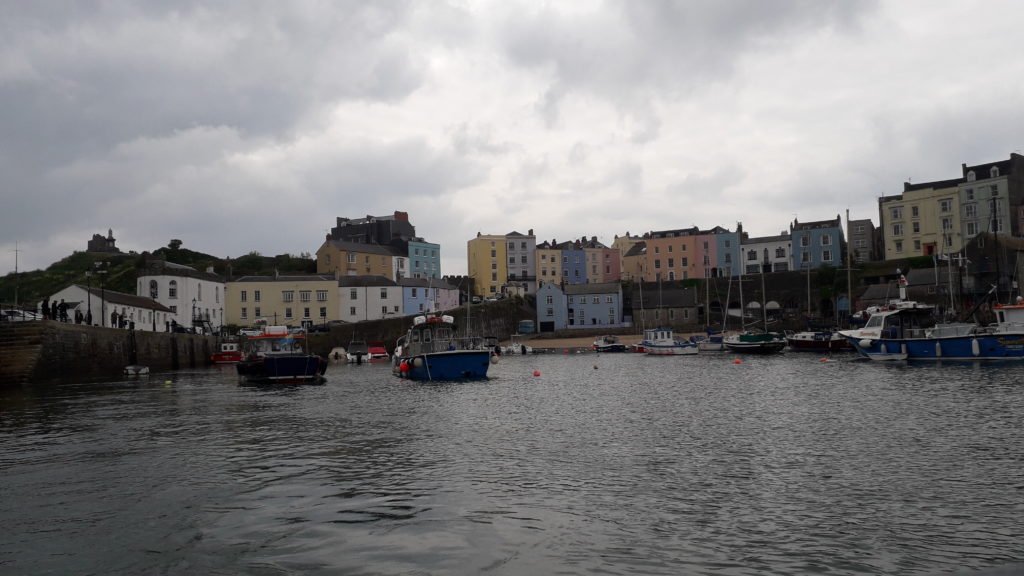
The sickness was a firebreak – defining and certain. I marvelled at autumn’s green from the back of the Cortina as mum drove me home, and I felt something new. I had never felt hunger before, pushed food around my plate; now I developed a voracious appetite, and a need to be outside, to become adventurous and to find things out for myself.
*
Helen and I came back through the woodland to the café on the edge of a green opposite the monastery for a cup of tea and a tooth-jangling sweet slice of cake. Mallards came to investigate and were rewarded with crumbs. And finally what we had hoped for: a fleeting glimpse of a red squirrel as it jumped through branches, sunlight catching fur. The last boat each day was at four o’clock, and we returned to the jetty. I patted my pockets in search of the tickets but Helen told me not to worry – no-one checks when you go on board on Caldey: the fare covers the return journey, and everyone comes back.
***
Jon Woolcott works for Little Toller Books. He is writing and researching Real Dorset for Seren Books. Follow him on twitter (@jonwoolcott) or Instagram (@dorsetjonw).
With thanks to Adrian Cooper of Little Toller Books and Jay Armstrong of Elementum for their editorial advice.